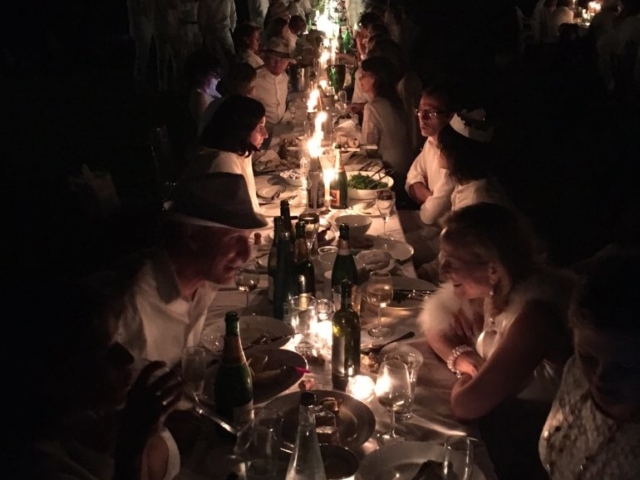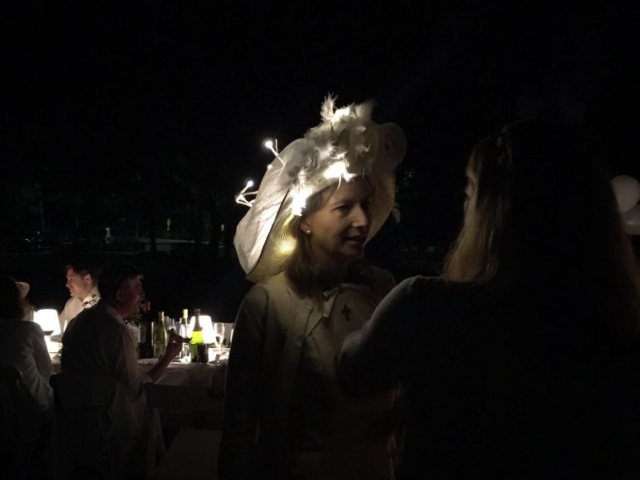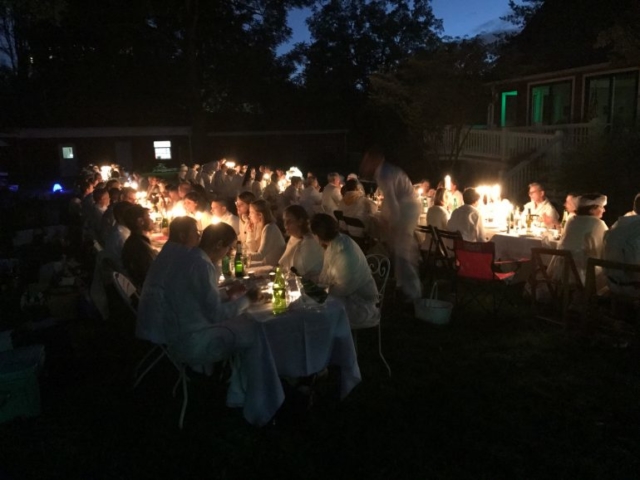
Americans and Germans are used to a direct communication style that the French perceive as rude. Why is this? How do professionals conduct successful business in France with this trait in mind?
A few days ago, my husband and I attended the fourth annual French-American Dinner. While we discussed Elon Musk’s plan to colonize Mars and the return of the adventure spirit with our table neighbors, I overheard a heated discussion on my left and right about Iran before the Iranian revolution and whether President Trump is a racist.
We spoke French, we drank Champagne, and the food had an undeniably French touch. In fact, the event reminded me of last month’s DC Dîner en Blanc where over 4,000 guests brought white tables, white chairs, white plates and silverware, and their own food and had dinner on Pennsylvania Avenue. Of course, Dîner en Blanc in DC is fun and exclusive, but, besides its origin, has nothing to do with actual French culture anymore.
Dîner en Blanc? Never heard of it.
Dîner en Blanc is a fancy outdoor party that started as an invitation-only event in Paris. In 1988, a French gentleman wanted to invite friends for dinner but didn’t have enough space in his apartment. He ended up inviting them to a picnic in a famous outdoor location in Paris (Le Bois de Boulogne) and asked them to wear white so they could identify each other. Today, the event has blossomed into a huge for-profit organization that’s licensed around the world. You can read the last recap from the Washington Post here.
Why is style and eloquence so important to the French?
As the official website states, “Le Dîner en Blanc recalls the elegance and glamor of high French society.” Nostalgia? Elitism? True on both counts, which makes the event a perfect introduction to my topic: the French love for style and eloquence which is at odds with the American and German preference for straightforward facts and details.
In France, overall effects are more important than details. This principle also applies to the language.
Back in the 17th century, the French aristocracy gathered in informal circles to talk about literature, religion, and poetry. Called “salons,” these gatherings gave people “a place to talk away from the stiff rules of the French court,” as Julie Barlow and Jean-Benoît Nadeau explain in The Bonjour Effect. Although they sound elitist, the salons were open to non-aristocrats as long as they were witty and had something to add to the conversation.
Over time, the salons evolved into handling serious business. With the advent of the French Revolution, the gatherings addressed more and more topics aiming “to change the society, to invent the future,” according to Emmanuel Bodo in his book L’Histoire de la Conversation (History of Conversation). These salons more or less disappeared after the Revolution as they were associated with aristocratic activities.
Today, many French people don’t realize how their history has impacted the way they talk and interact with their fellow citizens. The most obvious example is education, as French schools strongly emphasize philosophy.
Philosophy classes in France aim to teach students to think and talk formally. As Barlow and Nadeau noted, “Most French have been given the challenge, early in their lives, of discussing a topic [and] carefully studying an idea … by analyzing it or at least weighing the pros and cons. … Not everyone is good at discussing ideas and issues, but everyone understands the exercise.”
Salon-style conversations never disappeared in France; they simple moved to other locations. Today, they take place during dinner with family or friends or at the counter of cafés and bars.
Navigating business conversations with French people
American and German journalists prefer to research a story thoroughly, while their French counterparts often prioritize literacy style over investigative details.
French presentations are witty, eloquent, and generally peppered with quotes and historical references.
When Americans and Germans approach business conversations directly, it leaves their French colleagues feeling like they just took a cold shower. They feel ignored and rushed when they’d prefer to spend time getting to know everyone first.
French conversations don’t really follow any rules besides avoiding boredom! Talking is about exchanging views, even if they may be contradictory. According to Barlow and Nadeau, “The French love conversation in which diverse perspectives clash … That’s considered far more interesting than reaching consensus.”
Maximizing your success in French meetings
Few Americans and only some Germans speak French well enough to appreciate the finesses of French conversation. Unfortunately, the French don’t excel in English or German. Obviously, this makes it harder to score in your conversations with French business colleagues. However, by learning a few words of French, you’ll find it much easier to break the ice. Plus, French people highly appreciate efforts to establish a relationship with them in their mother tongue.
The following recommendations apply whether your business partner speaks French or English, as long as you share some common ground in either language.
Don’t be shocked if discussions get heated, and don’t be shy about presenting your opinions. French people are curious about foreigners’ opinions, particularly if they are shared in a historical or cultural context.
Given the importance of French history to the average French person, a review of the French-American history is certainly helpful. Consider starting with Lafayette, a strong supporter of the American Revolutionary War and friend of George Washington, Thomas Jefferson, and Alexander Hamilton.
Once you have a grasp of the cultural background of the French love for style and eloquence, you will find it easier to respect differences, make small talk before business meetings, and even listen to their lengthy presentations.
Of course, don’t feel bad if you can’t compete with their repartee. No one will expect perfection from a foreigner speaking French!
Learn more about French conversation in The Bonjour Effect or in this post about French business lunch
Photo credit: Alliance










This is one of your best articles, Catherine. I feel so much more prepared to interact socially with someone from France after reading it. Have you thought about teaching a class at one of the D.C. universities that has an International Studies program? You have practically written the entire curriculum for such a class through your blogs! margaret
Thank you! Also for reminding me of the universities. Enjoy your day dear Margaret!
Thanks Catherine. As a French woman, I take it as a compliment 😉 The success of this kind of diner in the US, prove that Americans finally appreciate that as well, unless they just appreciate having fun and love to celebrate.
Thank you for the invite to the French-American dinner last weekend!